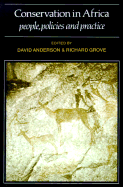Book contents
- Frontmatter
- Contents
- Preface
- List of contributors
- Introduction: The scramble for Eden: past, present and future in African conservation
- Part One Conservation ideologies in Africa
- Part Two Wildlife, Parks and Pastoralist
- Part Three Conservation priorities and rural communities
- Part Four Consequences for conservation and development
- Introduction
- 13 The political reality of conservation in Nigeria
- 14 Settlement, pastoralism and the commons: the ideology and practice of irrigation development in Northern Kenya
- 15 Approaches to water resource development, Sokoto Valley, Nigeria: the problem of sustainability
- 16 State policy and famine in the Awash Valley of Ethiopia: the lessons for conservation
- Index
13 - The political reality of conservation in Nigeria
Published online by Cambridge University Press: 04 April 2011
- Frontmatter
- Contents
- Preface
- List of contributors
- Introduction: The scramble for Eden: past, present and future in African conservation
- Part One Conservation ideologies in Africa
- Part Two Wildlife, Parks and Pastoralist
- Part Three Conservation priorities and rural communities
- Part Four Consequences for conservation and development
- Introduction
- 13 The political reality of conservation in Nigeria
- 14 Settlement, pastoralism and the commons: the ideology and practice of irrigation development in Northern Kenya
- 15 Approaches to water resource development, Sokoto Valley, Nigeria: the problem of sustainability
- 16 State policy and famine in the Awash Valley of Ethiopia: the lessons for conservation
- Index
Summary
In Africa the term conservation is most often associated with the provision of National Parks and game reserves and the protection of wildlife. In this area the aims of conservationists meet the desires of African governments to encourage the growth and maintenance of lucrative tourist industries. But conservation in the African context should not be seen merely in terms of nature conservation; it is also an important part of the reform process in land tenure systems, land-use patterns, and land management practices. It is primarily in relation to the control of man's exploitation of environmental resources that conservation has its greatest relevance for the governments of West Africa. In Nigeria, land reforms have long been the focus of concern over conservation, being viewed as the best insurance against abuse and misuse of land resources. At a general level, the goal of such reforms is a more controlled or guided use of the land and its resources to achieve sustained economic growth and to promote the well-being of the people. It is with this broader view of conservation as a reform process, linked to changes in land husbandry and land use, that this chapter will be concerned.
The social adjustments that any reform process may call for naturally make conservation a sensitive social and political issue.
- Type
- Chapter
- Information
- Conservation in AfricaPeoples, Policies and Practice, pp. 277 - 292Publisher: Cambridge University PressPrint publication year: 1988
- 1
- Cited by



